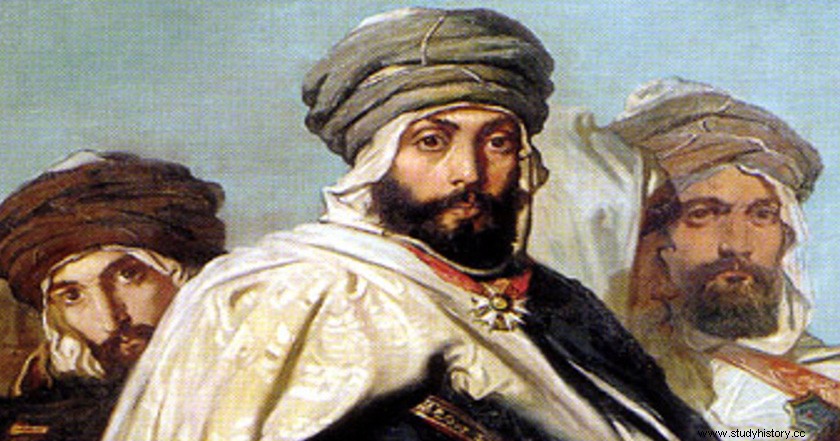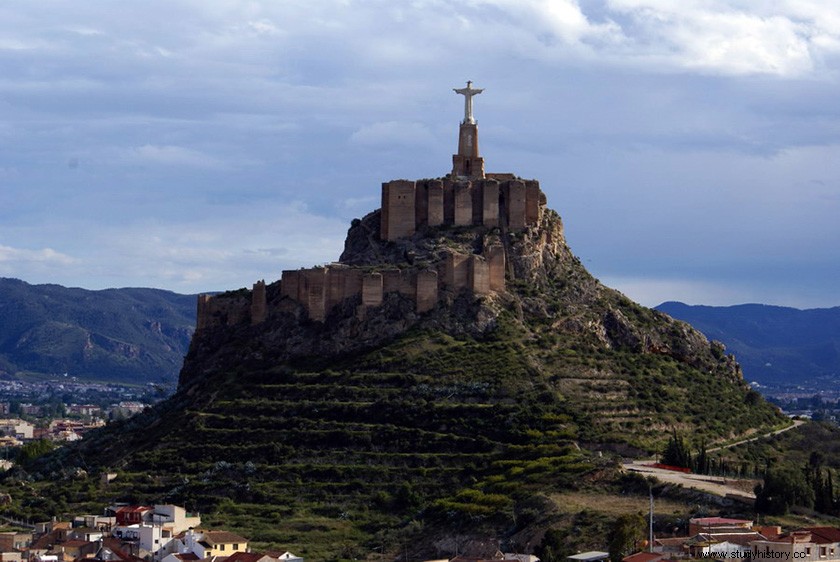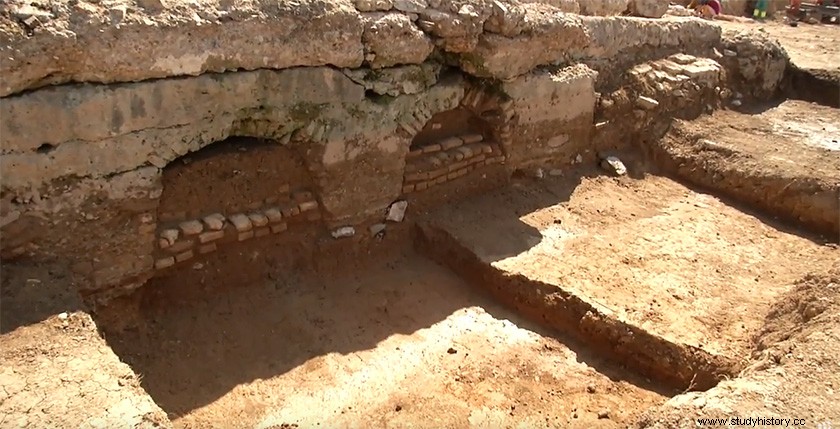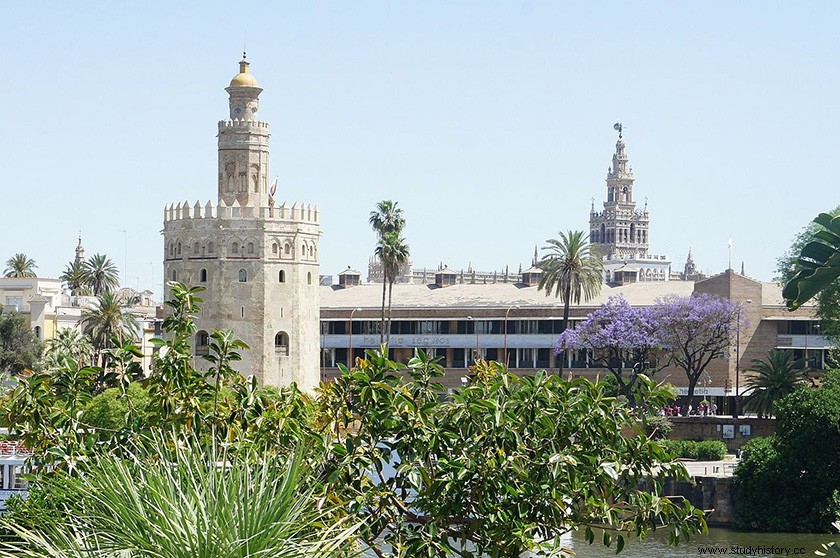
Ibn Mardanish , renamed King Wolf by contemporary Christians, was born around the year 1125 in the town of Peñiscola, during the Almoravid domain of al-Andalus. He did so within a family of Hispanic origin converted to Islam, an aspect that marked much of his future in history.
Ibn Mardanish's rise to power.
Around 1143, after the death of the emir Alí ibn Yusuf , the Almoravid emirate is mortally wounded. The pressure exerted by the Christian kings, especially by Alfonso VII of León who had his sights set on the southeast of the peninsula, led the successors of the deceased emir to a continuous increase in taxes in order to pay for the defense of al-Andalus . This fact had an impact on the increase in insurrections, leading the emirate to a growing political, military and religious weakness, which was taken advantage of by a series of Muslim lords, to emancipate themselves from the central power exercised from North Africa. This period is known as the Second Taifa Kingdoms .
One of these lords was Ibn Hud al-Mustansir, known to Christians as Zafadola , son of the last Taifa king of Zaragoza, before it was conquered by the Almoravids in 1110, and who took over the power of Murcia, becoming a vassal of the King of León, Alfonso VII. This event occurred around the year 1144. Only two years later, through the betrayal of some Christian knights, Zafadola died near Albacete. After a couple of poorly qualified heirs, Ibn Mardanish appears as king of Murcia (1147-1172) .

Castle of Monteagudo reinforced in the time of the Wolf King
The only Muslim power in the Peninsula.
We can at least think that this was Ibn Mardanish's dream, and what he fought for the rest of his life. According to the sources of the time, the Wolf King was a rather atypical Muslim; a "Muslim evil" for Arabic sources. He dressed like a Christian, he fought with their weapons, and his army was composed mainly of Aragonese, Navarrese and Catalans. His vision of his time was clear, he preferred to pay his corresponding outcasts, in exchange for protection, for which he was content with political freedom, in exchange for losing his economic independence. Religiously, his Islamism was moderate, attached to the doctrine of the Maliki school, and for this reason he clashed with the Almoravids and their Almohad successors.
All these aspects were consistent with the described dream of Ibn Mardanish, who tried to become the only Muslim power in al-Andalus. In short, we can think that he saw the Almohads as invaders from North Africa. He did not even care that the rest of the Peninsula fell into Christian hands, so that the Almohads would lose it. Far from creating his particular caliphate, his thoughts were to submit religiously to Baghdad, and economically to the Christian kingdoms.

Recent excavations at the residence of the Wolf King
For this he had numerous supports, apart from his lord Alfonso VII, he was able to count on a luxury ally in his father-in-law Ibrahim b. Ahmed, Abenmochico for the Christians, that he was Lord of Jaén. It is evident that for the Christian kingdoms and especially for the kingdoms of Castilla y León, the attitude of the Wolf King was seen as a lifeline. In short, their internal problems, added to those they had with their Portuguese neighbours, were easier to solve with the plug he exerted on the Muslims, the Kingdom of Ibn Mardanish.
The Wolf King against the North Africans.
As soon as he seized power, the Wolf King, in a phase of impasse between the fall of the Almoravids and the consecration of Almohad power, took the opportunity to besiege the Andalusian capital, Seville . The political control of the capital by Ibn Mardanish could seriously endanger the presence of the Almohad Caliphate in the Iberian Peninsula. Hence the quick response of the Caliph Abd al-Mumin, who sent an army after crossing the Mediterranean, which after reaching Seville apparently without much effort lifted the siege of the Andalusian capital.

The Almohad Seville, the dream of King Wolf.
Then 10 years of relative calm, which the Kingdom of Ibn Mardanish took advantage of to become strong in Mediterranean trade, with pacts with the Christian kingdoms and the Italian republics of Pisa and Genoa. Before a second attempt to conquer Seville in 1159, in this case the preparations were more important.
For the company he had the help of Abenmochico, and some Christian armies, who quickly conquered Úbeda, Baeza, Écija or Carmona. To be placed again at the gates of the two most important Andalusian cities, Córdoba and the Almohad capital on the Peninsula, Seville. But al-Mu'min again reacted quickly, in this case putting himself at the head of the army, leaving a checkpoint on the other side of the strait, to ensure the continued arrival of troops from Africa. It seems that, faced with the numerous Muslim army, the Wolf King decides to withdraw the siege while waiting for better opportunities.
Two years later, in 1161, the main clash between the Mozarabs and the Maghreb took place in another Andalusian capital, Granada. Where with the help of the population, including Jews persecuted by the Almohads, and the Muslims themselves dissatisfied with the Caliphate, Abenmochico's troops become strong around the Alhambra area, initiating a harsh siege of the city that lasted about a year. The Almohad Caliph has no choice but to send his own sons to reconquer the city, all while he, in North Africa, prepares the great army that was to put an end to Ibn Mardanish's insurgencies.

Maximum extent of the Wolf King's realm
The numbers of this army among Muslim chroniclers, as was usual in the sources of the time, are totally exaggerated. 300,000 horsemen, 400 ships and thousands of volunteers, that is, even if we remove the last zero from these figures, we are talking about a significant contingent. Hence, the sources speak of the al-Mumin company going beyond controlling the Wolf King. His true intention was to reconquer the border territories, occupied in the last years of the Almoravid period by the Christian military orders, which acted as a defensive stopper for the Christian kingdoms.
But luck smiled on both the Wolf King and the Christian kingdoms. In May 1163 the first Almohad Caliph al-Mumin died. His successor was his son Abu Yakub Yusuf , at that time Andalusian governor installed in Seville. Whence he departs to take possession of the caliphate. But it was not easy for him, the proof of this is the break suffered by the preparation of the great Almohad army.
Ibn Mardanish's decline, all against the Wolf King.
It is clear that the Wolf King was trying to take advantage of the internal problems of the Almohads. In the winter of 1164 he initiates a new siege of Córdoba and Seville, at the head of his mercenary armies, mostly Christian, obtained with the rich Mediterranean trade. Everything was a mirage, in the spring of the following year Almohad troops began to land in the area of the strait. In front of them, the Almohad governors of Córdoba and Málaga, brothers of the new Caliph Abu Yakub.
The new contingent quickly takes control of al-Andalus, lifts the siege of Seville and later decides to advance east. The path of the African army seemed triumphant, one after another, the squares related to the Wolf King either surrendered to the new Almohad power, or left free passage, among the latter Ibn Mardanish's own father-in-law. Abenmochico did not obstruct the way of the Africans, which cost him for the rest of the days the enmity of his son-in-law.

Gold dinar from the time of the Wolf King, a sample of the wealth that he hoarded
Alone and abandoned by the Christian kingdoms and those closest to him, he must face the almighty Almohad army. As if that were not enough, the Kingdom of Aragon decides to break the pacts with the Wolf King. Meanwhile, the Castilians immersed in succession problems after the death of Alfonso VII, and the arrival of a child, the future Alfonso VIII, is not in the business of helping his protégé. In such a way that the Almohades take control and loot most of the surroundings of Murcia. Only the capital is saved, with the Wolf King crouched inside and subjected to a harsh siege. Luckily for them, salvation came from the other end of the peninsula, the young kingdom of Portugal attacked the Almohad positions in Badajoz, the "bell" had just saved our protagonist.
In the year 1169 the enemies of the Wolf King multiplied, Aragon with Alfonso II attacked him from the north. The Almohads do not stop pressing from the south. In addition, he was at odds with his father-in-law in the west and with Castile trying to take advantage of Ibn Mardanish's problems, with a new protection pact in exchange for the very important castles of Vilches and Alcaraz.
An Almohad Caliphate in political, religious and economic prime does the rest, it seemed that they did not even need to attack the Wolf King to finish him off. In the following months, before the Almohad power and the accusations of "bad Muslim", desertions are the order of the day. Finally, Abenmochico surrenders Jaén, followed by Valencia to the north and Lorca to the south. In 1171 only the city of Murcia remains related to the Wolf King. Impoverished and therefore abandoned by his mercenary army, Ibn Mardanish the Wolf King, died in March 1172, immediately afterwards his sons delivered Murcia to the Almohads. It was the end of the Andalusian dream, al-Andalus fell into the hands of one of the most radical caliphates, which it had to endure in its eight centuries of history.
More info:
A review of the figure of Ibn Mardanish, Ignacio González Cavero, Miscelánea Medieval Murciana, 2007.
Moors and Christians, the great adventure of Medieval Spain, Juan José Esparza, Ed. The sphere of books, 2011.
History of Spain in the Middle Ages, Cood. Vicente Ángel Álvarez Palenzuela, Ed. Ariel, 2011.
